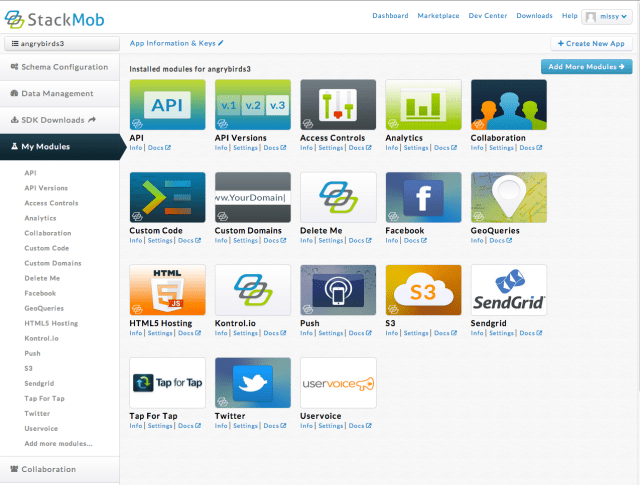StackMob, an end-to-end development platform for mobile applications, is today announcing the launch of the StackMob Marketplace for third-party services, as well as changes to its pricing structure for API calls. StackMob is now making API calls free. This latter news will impact the competitive landscape, which includes startups like Parse, Kinvey and others, all of which have traditionally charged developers as API calls increase alongside an app’s popularity.
Today, developers have to have an understanding of how many API calls they make, and if an app becomes really successful, developers are penalized for that with increased pricing. According to StackMob CEO Ty Amell, this isn’t really all that fair, explaining that it doesn’t matter to StackMob how many API calls the app makes – the cost to them doesn’t really go up. “It doesn’t matter to us whether someone’s making a million API calls or 20 million API calls – the cost is fairly manageable on our parts. So we felt like this was a blocker to innovation on the developer’s side,” he explains. “And we feel like API calls are starting to become a commodity, where it’s really how can you provide value beyond that?”
That’s where today’s second announcement comes in. In addition to generating revenue from other features, like HTML5, custom code, and unlimited push notifications, for example, StackMob is also launching a marketplace for third-party services. Here, the company is offering a one-stop shop for access to everything from analytics to ad networks, and even other back-end service providers like Urban Airship. Amell says the prices for the services are set by the providers, and are essentially the same as what developers would pay otherwise. StackMob earns a 20 to 30 perfect referral fee from the provider, but it’s adding its own margin on top of the prices the provider sets.
In today’s launch, the first partners include Apsalar (analytics), Kontrol.io (crash reports, including server-side), Crittercism (crash reporting) datownia (turn spreadsheets to APIs), inneractive (ad mediation biz), iron.io (queing service), PubNub (real-time messaging), SendGrid (SMTP relay), Tap for Tap (ad network), Urban Airship (BaaS), UserVoice (community management), and iGeolise (geofencing data).
Amell says the services were chosen based on a combination of developer requests for specific companies, as well as requests based on a general need. “We kept coming across all these edges cases, where we would get enough support requests for a feature, like Websockets, where we’d probably get it from about 60 percent of our user base,” he says. “But that’s not enough for us to spend the time to incorporate it into the core product. For us, it’s like an 80 percent margin.”
With the StackMob Marketplace, then, the company can help fulfill those requests through third-party relationships. And, to be clear, this is not simply a referral business where links take developers offsite to sign up. The modules, when activated, actually provision accounts on StackMob’s side, so developers never have to leave StackMob’s site. Some even support deeper integrations with the StackMob platform, where appropriate.
The initial Marketplace will be expanded in the future, as StackMob will open it up for other third parties to add themselves automatically. Additional companies will show up in the following weeks and months.
StackMob, backed by $7.5 million in Series A funding from Trinity, Harrison Metal, and Baseline, now has 15,000 developers on its platform, spread across six continents, who have created over 40,000 apps. The company has processed over 300 million API transactions, and, over the past year, averaged 339 percent monthly growth in API transactions. It has also sent 80 million push notifications in the past six months, including 19.7 million in November alone, and is currently seeing 30 percent growth in push month-over-month.


